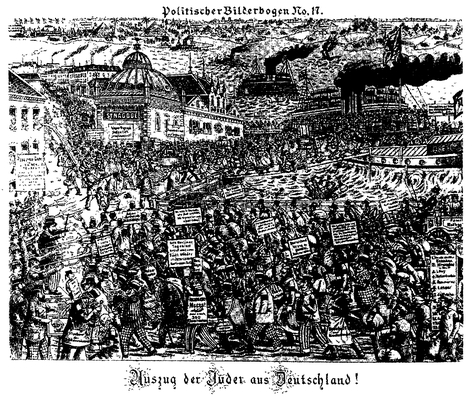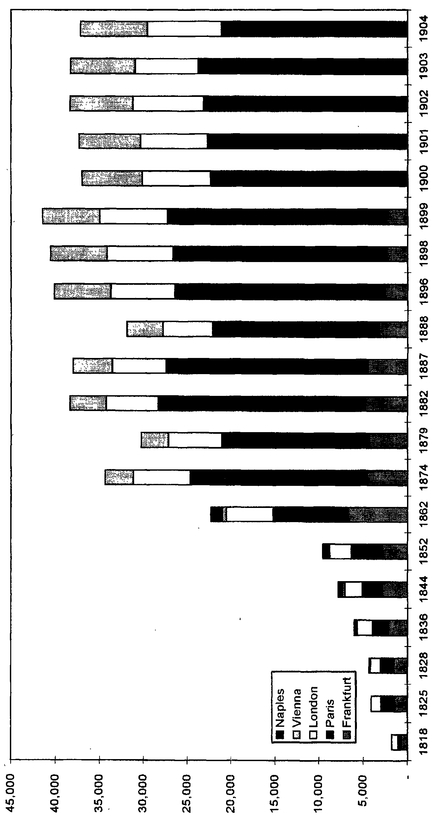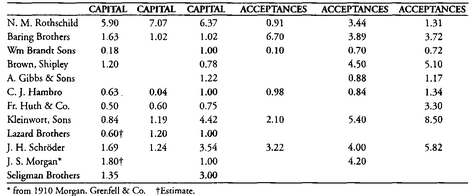The House of Rothschild (66 page)
Read The House of Rothschild Online
Authors: Niall Ferguson

At first, he got no further in London. Natty refused even to see him in 1901 (despite the intercession of his cousin Lady Battersea) and he clashed when Herzl gave evidence to the Royal Commission on Alien Immigration in 1902; in the wake of that first encounter Natty made it plain that he would “view with horror the establishment of a Jewish Colony pure and simple.” “Of one thing I am convinced,” he declared: “that the dream of Palestine is a myth and a will-of-the-wisp.” Leo was also opposed to Zionism in Herzl’s sense. It was only when Herzl changed his strategy, arguing that any Jewish colony in Sinai could be a part of the British Empire, that Natty became interested, introducing him to Joseph Chamberlain. His support increased markedly in the last years of Herzl’s life, though their plan for a British-Jewish colony in Sinai ultimately came to nothing because of diplomatic obstacles.
Why did the Rothschilds give Herzl’s original conception of a “Jews’ State” such short shrift? Part of the reason was that, despite his assurances that they would benefit financially and in other ways from supporting him—he even offered to make the first elected “prince” of the new state a Rothschild—Herzl’s utopia had markedly socialist characteristics (notably a nationalised banking system) which were hardly calculated to appeal to them. Indeed, Herzl had an offputting tendency to mix protestations of altruism with threats to “liquidate the Rothschilds” or to “wage a barbaric campaign” against them if they opposed him. But there was another more important objection, and Herzl quite openly acknowledged it himself: if a Jewish nation state were to be created, it would very probably encourage anti-Semites to question the existing national identities of assimilated Jews. Natty was a Jewish Eng lishman just as as Alphonse was a Jewish Frenchmen, and Albert a Jewish Austrian. They did not share Herzl’s pessimistic and prophetic view—inspired by covering the Dreyfus affair for the
Neue Freie Presse
—that such national rights of citizenship would one day be revoked by anti-Semitic governments; far from seeing Zionism as an “answer to the Jewish question,” they saw it as a threat to their position. To the Rothschilds, a cartoon like the one which depicted them—not for the first time—as part of a throng of Jews leaving Germany was deeply disturbing, even if they were pictured arriving at the dockside in their own private carriage (illustrations 8.v and 8.vi). Such a vision of mass emigration, whether to the Holy Land or (as the anti-Semitic cartoon wishfully suggested) to the bottom of the sea, represented nothing less than the negation of the social position their family had achieved since Nathan himself had arrived in England as an alien immigrant a century before: that of royalty in the eyes of many Jews, aristocracy in the eyes of most Gentiles, but at the very least subjects or citizens of the countries of their birth. With the benefit of hindsight, we can see that Herzl was a prophet. Less than half a century after his death, the German, Austrian and French Rothschilds had all fallen victim to just the anti-Semitic onslaught he had foreseen. But it is equally easy to see why, at the time, his vision seemed a fantastic and even dangerous one,
Neue Freie Presse
—that such national rights of citizenship would one day be revoked by anti-Semitic governments; far from seeing Zionism as an “answer to the Jewish question,” they saw it as a threat to their position. To the Rothschilds, a cartoon like the one which depicted them—not for the first time—as part of a throng of Jews leaving Germany was deeply disturbing, even if they were pictured arriving at the dockside in their own private carriage (illustrations 8.v and 8.vi). Such a vision of mass emigration, whether to the Holy Land or (as the anti-Semitic cartoon wishfully suggested) to the bottom of the sea, represented nothing less than the negation of the social position their family had achieved since Nathan himself had arrived in England as an alien immigrant a century before: that of royalty in the eyes of many Jews, aristocracy in the eyes of most Gentiles, but at the very least subjects or citizens of the countries of their birth. With the benefit of hindsight, we can see that Herzl was a prophet. Less than half a century after his death, the German, Austrian and French Rothschilds had all fallen victim to just the anti-Semitic onslaught he had foreseen. But it is equally easy to see why, at the time, his vision seemed a fantastic and even dangerous one,
8.vi: Anon., Auszug
der Juden aus Deutschland!,
Politischer Bilderbogen, Nr. 17 (1895).
der Juden aus Deutschland!,
Politischer Bilderbogen, Nr. 17 (1895).

NINE
“On the Side of Imperialism” (1874-1885)
If the special interest of the investor is liable to clash with the public interest and to induce a wrecking policy, still more dangerous is the special interest of the financier... These great businesses—banking, broking, bill discounting, loan floating, company promoting—form the central ganglion of international capitalism. United by the strongest bonds of organisation, always in the closest and quickest touch with one another, situated in the very heart of the business capital of every State, controlled, so far as Europe is concerned, chiefly by men of a single and peculiar race, who have behind them many centuries of financial experience, they are in a unique position to manipulate the policy of nations ... Does anyone seriously suppose that a great war could be undertaken by any European State, or a great State loan subscribed, if the house of Rothschild and its connexions set their face against it?
Every great political act involving a new flow of capital, or a large fluctuation in the values of existing investments, must receive the sanction and the practical aid of this little group of financial kings ... As speculators or financial dealers they constitute ... the gravest single factor in the economics of Imperialism ... Each condition ... of their profitable business ... throws them on the side of Imperialism ... There is not a war, or a revolution, an anarchist assassination or any other public shock, which is not gainful to these men; they are harpies who suck their gains from every sudden disturbance of public credit... The wealth of these houses, the scale of their operations, and their cosmopolitan organisation make them the prime determinants of economic policy. They have the largest definite stake in the business of Imperialism, and the amplest means of forcing their will upon the policy of nations ... [F]inance is ... the governor of the imperial engine, directing the energy and determining the work ...
J. A. HOBSON,
IMPERIALISM:
A
STUDY
(1902)
IMPERIALISM:
A
STUDY
(1902)
Decline is a relative concept. Compared with their commanding position in the international capital market before 1880, the Rothschilds unquestionably declined thereafter. Compared with rival banks, they were less profitable and grew less rapidly. Yet as table 9.i shows, the Rothschilds remained in absolute terms a formidable financial force even on the eve of the First World War. N. M. Rothschild & Sons was far and away the largest private bank in the City of London in terms of capital. This dominance is even more impressive if one recalls that the London house was still just one of four Rothschild houses. Illustration 9.i shows the combined capital of the Rothschild houses according to successive partnership contracts. Between 1874 and 1887 it rose from £34.4 million to £38.0 million, and reached a peak of £41.5 million in 1899. In 1904, the last year for which combined figures were drawn up, it was still £37.1 million. If capital had not been withdrawn after 1898, the total capital would have been in excess of £45 million. This made N. M. Rothschild not only the biggest private bank in London, but one of the biggest banks of any kind in the world. In 1881 seventy-one different credit establishments were quoted on the Paris bourse with a paid-up capital of 1.49 billion francs: the combined Rothschild houses alone had capital not far short of a billion francs and the Paris house—with capital of 590 million francs—was still one of the biggest French banks. In 1913 the total share capital of the five German great banks (the Darmstädter, the Disconto-Gesellschaft, the Deutsche, the Dresdner and the Berliner Handels-Gesellschaft) totalled 870 million marks (£43 million)—not much more than the combined capital of the Rothschild houses a decade before.
Of course, the Rothschilds’ balance sheet was substantially smaller than that of the big joint-stock deposit banks. The biggest British “clearing” bank, the Midland, had deposits worth £125 million on the eve of the First World War, compared with an equivalent figure for the London house (assets minus capital) of just over £14 million. For Deutsche Bank—the biggest German bank in 1914—the figure was £74 million. But this does not compare like with like. The Rothschilds had never been interested in taking deposits. Their principal concern was to use their capital as the basis for large-scale bond market underwriting, attracting outside funds directly into new securities, rather than soliciting deposits.
The less impressive difference between the Rothschilds and their rivals was that the former were less profitable in relative terms. Table 9b allows a more systematic comparison with five other major City banks. It shows that the London house’s average profits as a percentage of capital tended to decline from a peak of 9.8 per cent in the 1870s to just 3.9 per cent in the decade 1900-9. The Rothschilds, it seems, played safe: with their enormous accumulation of capital inherited from the previous generations, Natty and his brothers apparently felt under no pressure to aim at the kind of high returns achieved by Barings or Schröders, much less a joint-stock bank like the Midland. Figures for acceptances between 1890 and 1914 also show the London house lagging behind Kleinworts, Schröders and Morgan Grenfell, and even being overtaken by Brandts and Hambros after 1910. Annual acceptances by N. M. Rothschild for the period 1890-1914 averaged £2.7 million, compared with £5.6 million for Barings, £7.2 million for Schröders and £9 million for Kleinworts, the market leader. In terms of assets, the available balance sheet figures show Barings and Schröders rapidly gaining on N. M. Rothschild in the decade before 1914. In 1903 assets at New Court had totalled £25 million, compared with £10.3 million at Schröders and £9.9 million at Barings. Ten years later, the Rothschild total was more or less unchanged, while Schröders had increased their balance sheet to £19.1 million and the figure at Barings had risen to £15.8 million.
9.i: Combined Rothschild capital, selected years (& thousand).

Table 9a: Capital and acceptances of N. M. Rothschild & Sons and other City merchant banks, 1870-1914 (£ million).

Sources: RAL, RFamFD/13F; Cassis,
City,
p. 33;
idem, City bankers,
pp. 31f.; Kynaston,
City,
vol. I, pp. 312f.; vol. II, p. 9; Chapman,
Merchant banking,
pp. 44, 55, 121f., 200f., 208f.; Roberts,
Scbroders,
pp. 44, 57, 99, 527-35; Ziegler,
Sixth great power,
pp. 372-8; Wake,
Kleinwort Benson,
pp. 472f.
City,
p. 33;
idem, City bankers,
pp. 31f.; Kynaston,
City,
vol. I, pp. 312f.; vol. II, p. 9; Chapman,
Merchant banking,
pp. 44, 55, 121f., 200f., 208f.; Roberts,
Scbroders,
pp. 44, 57, 99, 527-35; Ziegler,
Sixth great power,
pp. 372-8; Wake,
Kleinwort Benson,
pp. 472f.
Another indicator of relative decline is the fact that, in terms of individual wealth, the Rothschilds ceased to be exceptional. Natty was the richest of his generation of English Rothschilds (leaving £2.5 million when he died in 1915); but at least thirteen British millionaires in the period 1890-1915 left as much as or more than him. Across the Atlantic, Junius Morgan had already left that amount when he had died in 1890. When his son Pierpont died in 1913, the estimated net value of his estate, excluding his art collection, was $68.3 million (£14 million); including artworks, his fortune was closer to £24 million. Small wonder the Morgans partner Clinton Dawkins felt like bragging in 1901:
Old Pierpont Morgan and the house in the U.S. occupy a position immensely more predominant than Rothschilds’ in Europe ... Taken together, the Morgan combination of the U.S. and London probably do not fall very far short of the Rothschilds in capital, are immensely more expansive and active, and are in with the great progressive undertakings of the world.—Old P Morgan is well over 60 ... [but he has] behind him ... young Morgan, under 40 with the makings of a biggish man, and mysetf.—The Rothschilds have nothing new but the experience and great prestige of old Nattie ... Therefore, provided we can go on and bring in one or two good men to assist the next 20 years ought to see the Rothschilds thrown into the background and the Morgan group supreme.
1
1
Other books
The Voices of Heaven by Frederik Pohl
The Grind Don't Stop by L. E. Newell
Rodeo Reunion by Shannon Taylor Vannatter
Promises by Lisa L. Wiedmeier
DW01 Dragonspawn by Mark Acres
He's a Rebel by Mark Ribowsky
The Vampyre Legal Chronicles - Marcus by CC MacKenzie
Death Knows My Name (Memory Keepers) by Narome, Casse
Dolly by Anita Brookner
